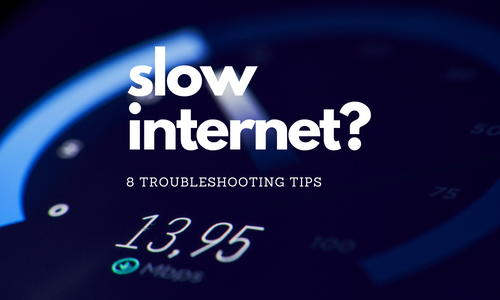A slow internet connection is more than just a minor annoyance. It can be a major hindrance to your productivity, and it can even cost you money if you’re unable to complete tasks in a timely manner.
If you’re dealing with a slow internet connection, there are a few things you can do to try and troubleshoot the issue. Read on for eight tips that may help you get your connection back up to speed.
Check your internet speed
The first step is to check your internet speed. You can do this by running a speed test at www.speedtest.net. If your results are significantly lower than what you’re paying for, contact your internet service provider (ISP) to see if there’s an issue on their end.
Check Your Internet Service Provider’s Status Page
If you’re experiencing slow speeds, another thing you should do is check your internet service provider’s (ISP) status page. This page will contain any information about outages or scheduled maintenance in your area. If there is an issue with your ISP’s network, there’s not much you can do other than wait for it to be resolved. However, knowing that the problem isn’t on your end can give you some peace of mind.
Check Your Wi-Fi Signal Strength
If you’re connecting to the internet wirelessly, weak signal strength can cause slowdown. Try moving closer to your router or modem to see if that boosts your speeds. You can also check to see if there are any obstructions between your devices and the router that could be weakening the signal. If you’re still having trouble after making these adjustments, you may need to upgrade your router or buy a range extender.
Check for malware
Malware can cause all sorts of problems, including slowing down your internet connection. Run a scan with your anti-malware software to see if there’s anything causing problems. if there is, give us a call to come out and assist.
Clear Your Browser’s Cache and Cookies
Your browser’s cache stores certain webpages so they can load faster when you revisit them. However, over time, this cache can become full and start slowing down your browser—and by extension, your internet connection. Clearing your cache on a regular basis can help prevent this slowdown from happening. You should also clear cookies periodically since they can also start to bog down your browser over time.
In most browsers, you can clear the cache by going to Settings > Advanced > Clear browsing data
Reboot Your Router or Modem
If all else fails, sometimes simply restarting your router or modem can improve your speeds by clearing out any lingering issues that may have developed over time. Just unplug the device from the power outlet, wait 30 seconds, then plug it back in again and wait for it to boot up completely before trying to reconnect to the internet.
Close unused tabs and programs
If you have a lot of tabs and programs open, it can bog down your internet connection. Close anything you’re not using to free up some resources.
Connect directly to your modem
If you’re using a router, try connecting directly to your modem with an Ethernet cable to see if that makes a difference—sometimes routers can slow things down as well.
Conclusion
A slow internet connection is no fun for anyone involved. Fortunately, there are several things you can do to troubleshoot the problem. Start by checking your internet speed and then moving on to other potential causes like malware, a bloated browser cache, too many open tabs and programs, or even a router that’s slowing things down. If all else fails, connect directly to your modem to see if that makes a difference. With any luck, one of these tips will help get your internet back up to speed in no time!
If not, give us a call!



